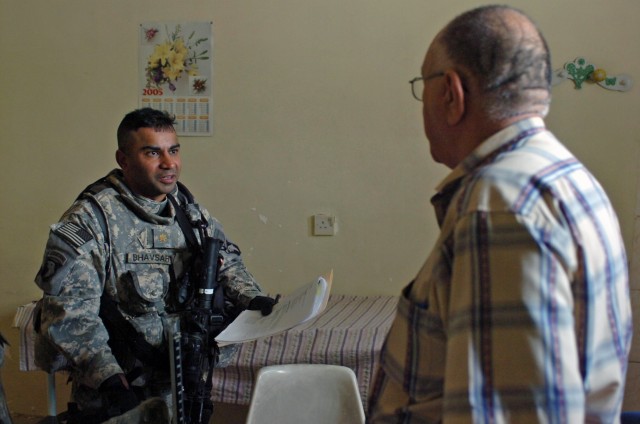BAGHDAD (Army News Service, April 30, 2008) - Multi National Division-Baghdad Soldiers visited health clinics in western Baghdad on April 2, after receiving reports that many were lacking medical equipment and power to adequately provide care for their local populace.
Upon receiving the reports, Maj. Amit Bhavsar, brigade surgeon for 2nd BCT, 101st Abn. Div., decided to see the problems first hand with visits to clinics in Washash, Iskan and Adil.
Bhavsar learned "the reports were accurate;" however, he also said he needed to personally see the effect the issues were having on the clinics and the local populace as a whole.
"I wanted to see what that meant," said Bhavsar. "The main things were: yes, all three clinics did lack power - enough power where they couldn't adequately perform their mission throughout the day. That lack of power was limiting their ability to carry out certain functions."
<b> Lack of Fuel </b>
The three hospitals he visited reported they were only getting around two hours of power per day, which drastically cuts down on the ability to treat patients.
"All the clinics had generators, but most of them didn't have enough fuel to run the generators all the time. They couldn't refrigerate or operate all their equipment, especially electronic equipment. So, they were very limited on what services they could offer throughout the day because of the lack of power," he said, adding they couldn't perform immunizations because they require 24-hour refrigeration.
The Iraqi government estimates that 70 percent of critically injured patients die in emergency care units due to the current lack of medical staff and supplies.
This is a serious issue; health clinics play a vital role in providing immediate and quality health care to their local population. Without the proper services, the population could potentially decrease and open the community to a number of other possible problems and diseases.
Despite these challenges, life goes on inside the hospitals, which have one primary focus and concern: the health of their local citizens.
<b> Back to Basics </b>
"The hospitals are running in a way you would expect them to run in a third-world country," said Bhavsar. "The physicians and the staff will make due with what they have and they will do their best. When you don't have an EKG or lab capabilities to diagnose a heart attack, you go back to simple things and you do a lot of guess work."
Bhavsar said he believes that without the capabilities to perform their jobs, doctors just have to go back to their training and get hands-on with the patients.
"In a lot of the places, the lack of equipment is certainly affecting medical care, but they will still try with the best of their ability," said Bhavsar. "Not having that equipment makes the practice of medicine much less of an exact science and more of an art; and surely, mortality increases significantly when you're working that way.
The clinic in Adil is a prime example. It is a primary care clinic that essentially does obstetric care and muscular and skeletal care, said Bhavsar. It is extremely difficult for the rheumatologist, who specializes in bone and joint disorders, to have a meaningful practice without being able to do lab tests required to diagnose certain conditions.
Getting the medical clinics up to their full potential would go a long way in helping the local communities as a whole, he said.
"By functioning appropriately they would have to assume a primary care and preventive medicine and public health role in the community," Bhavsar said.
"That involves things like normal newborn child screenings, prenatal examinations, immunizations and appropriate referrals to hospitals for conditions picked up early."
It's a community clinic, and it supports the community by keeping people healthy by increasing the access to medical care, added Bhavsar. But it's not necessarily working that way because of the limitations.
"You don't have immunizations, the clinics are limited to the number of hours they can stay open, and the lab capabilities are limited," Bhavsar said. "So they're severely limited in performing that role."
As was the case with the previous hospital, the Iskan clinic was also experiencing a lack of fuel to power the generator which, in turn, supplies electricity to the building. As a result, the patients and workers gathered in near darkness except for the light coming through the front entrance.
The pharmacy was also spread thin, with only 25 percent of the shelves stocked.
There were only two workers present at Iskan that day: a doctor and the front door receptionist. It served as an indicator for the visiting MND-B Soldiers that help is needed to boost these hospitals' abilities to care for their local populace.
"We are going to get together and discuss potential assistance for these clinics," Bhavsar said, "not just the fuel issue, but some of the shortfalls within the clinic."
"We'll look to provide some of this equipment and to assess pregnant patients and basic diagnostic equipment, such as stethoscope," he said.
(Sgt. James Hunter serves with the 2nd BCT Public Affairs Office, 101st Abn. Div., Multi National Division-Baghdad)






Social Sharing